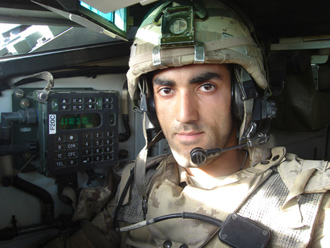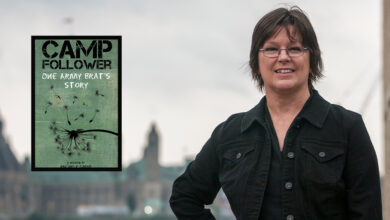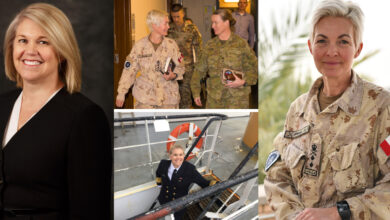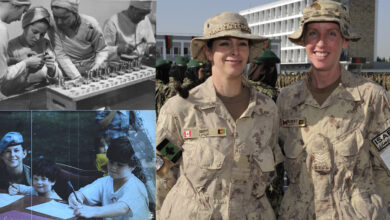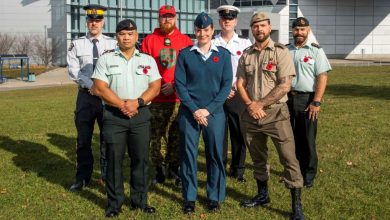CMF Profiles
Documentary of Fallen Soldier Helping Others Understand War and Loss
By Laura Earl-Middleton
He was 22 years-old, young and full of life, a son, a brother, a boyfriend. Trooper Marc Diab was the ‘everyman’ Canadian Soldier doing his duty in Afghanistan, excited to serve there with his comrades in arms. Trooper Diab was a new generation of soldier, carrying his video camera with him always, showing his friends and family what he was experiencing first hand. Not a journalist presenting the war through an objective lens, but a soldier, telling the story as he saw it, through the lens of a young man who was coming of age in the social media generation.
In March of 2009, Trooper Diab of the Royal Canadian Dragoons was killed just three weeks before he was to return home, when his vehicle struck an improvised explosive device.
 The documentary: If I Should Fall: A True Story of the Afghan War Experience, is Trooper Diab’s story.
The documentary: If I Should Fall: A True Story of the Afghan War Experience, is Trooper Diab’s story.
The project started two years ago when the team at Joint Media of London, Ontario was doing a television show called The Afghan Diaries and wanted to do an episode on what happens when a soldier dies.
Producer Paul Culliton says that the first family they interviewed were the Diabs and following that interview they knew they didn’t need to look any further. Culliton feels that by telling Marc’s story well, perhaps they could tell the story of all the soldiers that have fallen in Afghanistan.
Diab’s family experienced civil war in Lebanon before moving to Canada. Their son Marc had always dreamed of being a soldier but wasn’t permitted to join in Lebanon because he was the family’s only son. Marc’s dream came true when he joined the Canadian Forces.
 Culliton says the Diab family was like so many new Canadian families in our history whose children joined the service during times of war. Many families who immigrated from the British Isles had children who served during World War I and World War II. He says it was humbling to meet the Diab family and see their patriotism.
Culliton says the Diab family was like so many new Canadian families in our history whose children joined the service during times of war. Many families who immigrated from the British Isles had children who served during World War I and World War II. He says it was humbling to meet the Diab family and see their patriotism.
The full-length feature documentary uses Marc’s own film footage, interviews with his family, his girlfriend and his comrades, combined with commentary from Retired Major General Lewis MacKenzie and others, to present a very different type of ‘war’ film.
If I Should Fall is the next chapter,” explains Culliton. “It’s that terrible time we don’t typically hear about…the time after the notification, when the cameras are off, when the family is alone; (through the documentary we learn) what their experience is, how they relate to each other and just how they all experience Marc’s death. From that end it’s a very unique film.”
He says that in trying to show the dynamics of loss, it speaks to ‘everybody differently’. That is why Culliton feels that the film is connecting with a broader audience. He notes that while grief is individual, loss is a universal experience. By showing the dynamics of loss from multiple perspectives, he says the reaction from audiences has been diverse, and speaks to the multifaceted appeal of the documentary.
Culliton recalls the response of one particular viewer at a Remembrance Day showing in London, Ontario.
“Before the viewing he said to me, ‘I want to understand what happened when my father passed away in the Second World War, when the news came home’ He came up to me after seeing the film and said: ‘now I understand’.”
According to Culliton the audiences are as varied as their reactions, noting, for example, why the Winnipeg Reel to Reel film festival, an event sponsored by the Mennonite Media Society, traditionally a pacifist community, decided to feature the doc.
 “They felt it was important, for the youth of their community to watch this film so they could understand the honour and sacrifice of soldiers,” says Culliton.
“They felt it was important, for the youth of their community to watch this film so they could understand the honour and sacrifice of soldiers,” says Culliton.
The Buffalo Niagara film festival has chosen to show If I Should Fall in part because the American audience is seeing a mirror image of their own experience serving in Afghanistan. In Sydney, Australia, the film was part of the Lebanese Film Festival, reflecting Marc Diab’s cultural heritage.
“One military spouse wanted to buy the documentary so she could understand what her husband went through,” says Culliton. “The experience of his (Marc’s) family is very similar to other families, it really speaks to other (military) families.”
Perhaps the most prophetic element of Trooper Marc Diab’s story is the fact that he made a video before he left for Afghanistan, which he called “See You Tomorrow” to show at his funeral just in case something happened to him.
And, with the recent release of If I Should Fall on DVD, countless more people across the globe will know the story of Trooper Marc Diab, and perhaps through him, the story of so many others.
If I Should Fall: A True Story of the Afghan War Experience is a not-for-profit project, with all proceeds from the DVD sales going to the Military Family Fund and the Marc Diab Children’s Fund. For more information visit www.ifishouldfall.com.
Top photo: Trooper Marc Diab in a Coyote.
Middle photo: Paul Culliton receives the Award of Excellence.
Bottom photo: Trooper Diab’s comrades carrying his coffin at his ramp ceremony in Kandhar.


